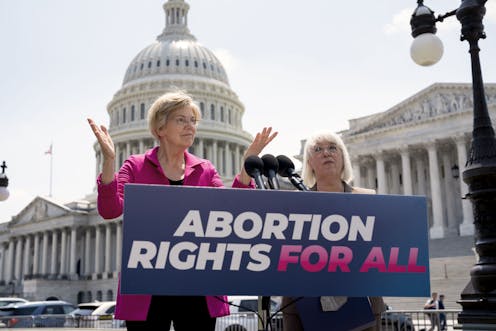
In the landmark 1973 decision of Roe v Wade, the US Supreme Court held that the right to privacy provided by the 14th amendment to the US Constitution protects a woman’s right to choose to have an abortion. Last month, a leaked draft of Dobbs v Jackson Women’s Health Organization revealed that a majority of the Supreme Court is poised to overturn that decision.
How did it come to this? In part, it’s a result of the extreme politicisation of the US judiciary, with judges routinely appointed based on their political views. Many people voted for former US President Donald Trump because he promised to appoint conservative judges. Many others voted for President Joe Biden because he promised to appoint judges that would protect Roe and other progressive laws.
Especially prominent in leading the charge against Roe v Wade and the politicisation of the US courts has been the Federalist Society, a libertarian-conservative legal movement. Founded in 1982, the society has played a major role in “deliberately, diligently shifting the country’s judiciary to the right”. As well as training and socialising conservative law students, lawyers and professors, the society helps appoint young conservatives to prominent positions in government and on the courts.
The society’s success has been startling. Drawing on an expansive understanding of free speech, it has been influential in weakening laws that limit how much can be spent on elections (the 2020 US election cost more than $14 billion). It has made gun control more difficult, almost led to the overthrow of Barack Obama’s signature healthcare law, and helped gut voting rights protections. Six of the nine judges on the US Supreme Court are current or former members of the Federalist Society.
Fortunately, political views are not relevant for appointment to the judiciary in Australia. But we must be vigilant: some politicians are publicly agitating for the creation of a similar legal movement here.
In 2020, a majority of the High Court of Australia held that Aboriginal Australians are not “aliens” under the Constitution – even if they were not born in Australia and are not citizens. In the Love; Thoms case, the Court explained that Aboriginal and Torres Strait Islander peoples’ longstanding and deep connection to Country means they cannot be considered as not belonging to the Australian community – even if they don’t hold citizenship.
In reaching this decision, the court extended the land-ownership principles of the famous Mabo case to determine who is a member of an Aboriginal group.
Given that few Aboriginal Australians are non-citizens facing deportation, the decision has limited practical consequences. But it infuriated many conservatives in and outside government. Peter Dutton claimed the decision was a stunning example of judicial activism, while IPA research fellow Morgan Begg called it the “most radical judgment in Australian history”. Former LNP senator John Stone even exclaimed that parliament should impeach the four judges in the majority.
Former Senator Amanda Stoker was the most forthright. In a paper presented to the conservative Samuel Griffith Society, the assistant minister to the attorney-general (as she then was) praised the work of the US Federalist Society. Drawing on their example, Stoker argued High Court judges should be selected on the basis of ideology with the aim of overturning Love; Thoms in the same way that Republican politicians have stacked the US Supreme court hoping for an overturning of the decision in Roe v Wade.
Stoker may have lost her Senate spot, but she might succeed in this endeavour. In 2020 and 2021, two justices of the High Court who found in favour of Daniel Love and Brendan Thoms retired, and were duly replaced by Morrison government appointees. Several months later, the federal government petitioned the High Court to overturn Love; Thoms. If the government is successful, some descendants of Australia’s First Nations peoples could be declared “aliens” in the country their people have occupied for more than 60,000 years.
It is not only our highest court that has seen political interference. Although the US Supreme Court receives the most attention, the Federalist Society has been successful at securing conservative judges at all levels of America’s court hierarchy. Similar moves to stack the Administrative Appeals Tribunal (AAT) in Australia have been exposed by a recent Senate inquiry.
The AAT reviews government decisions. Members must be – and be seen to be – independent. However, over the past few years, concerns have been raised about the appointment process. In March this year, the Senate Legal and Constitutional Affairs Committee found that the process of selecting AAT members had been inappropriately influenced by personal connections and political affiliations. Up to 40% of those appointed in the last three years by the Morrison government had political backgrounds. The committee recommended the current AAT be disbanded and a new system established as a matter of urgency.
The Albanese government should adopt this recommendation. It should also make sure that appointments to all Australian courts and tribunals are made without reference to political ideology. The last thing we need is to follow the US example.
Harry Hobbs is a member of the ALP.
George Newhouse is a member of the ALP, a director of the National Justice Project and a Company Secretary and member of the McKell Foundation.
This article was originally published on The Conversation. Read the original article.







